★½
“Well, that’s 1 Gb of disk-space I won’t get ba… [Delete] Oh, never mind.”
 Sunny Justice (Carter) is a former soldier, who is somewhat estranged from her sister, but who returns to town when the sibling – who also happens to be the mayor – dies under mysterious circumstances [savaged by a dog]. Turns out she was about to blow the whistle on developer Billy Joe Rivas (Gorshin), who has both designs on the town, and who has been using his mine as a dump for toxic-waste. The local sheriff (Singer) had bedded both sisters, but he refuses to act, and federal authorities prove no willing, so Sunny calls up some of her old pals, who were part of an all-female Special Forces unit, to take matters into their own hands. Rivas doesn’t take kindly to having his money-making scheme interfered with, and calls in reinforcements of his own, using his East-coast mob connections.
Sunny Justice (Carter) is a former soldier, who is somewhat estranged from her sister, but who returns to town when the sibling – who also happens to be the mayor – dies under mysterious circumstances [savaged by a dog]. Turns out she was about to blow the whistle on developer Billy Joe Rivas (Gorshin), who has both designs on the town, and who has been using his mine as a dump for toxic-waste. The local sheriff (Singer) had bedded both sisters, but he refuses to act, and federal authorities prove no willing, so Sunny calls up some of her old pals, who were part of an all-female Special Forces unit, to take matters into their own hands. Rivas doesn’t take kindly to having his money-making scheme interfered with, and calls in reinforcements of his own, using his East-coast mob connections.
Awful. Mind-numbingly awful. Carter is best known as the female lead in Tremors, one of our all-time favourites, but this is a terrible combination of bad acting, poor scripting and terrible action sequences. It can’t even make up its mind what it wants to be, with a couple of sex scenes that don’t even have any nudity. Meanwhile, the largest-breasted ex-Special Forces girl (Michelle McCormick) is working as a go-go dancer. Not that she shows any flesh either, though I was amused by the way the inevitable training montage is interrupted for an entirely gratuitous hot-tub scene.
None of the actresses are convincing as ex-soldiers, having arms like twigs, though there is sporadically some half-decent martial-arts action. My interest was briefly piqued when Sunny uttered the immortal line, “I want to put the squad back together,” but there are just too many moments worthy of scorn for this to last. The two dog-attack sequences could hardly have been less credible if they’d just lobbed a Chihuahua at the victims using a catapult, and the final battle consists almost entirely of stuntmen falling off roofs out of shot. I’m left to presume Cynthia Rothrock must have rejected this one, and she was entirely right to do so.
Dir: Allen Plone
Star: Finn Carter, Frank Gorshin, Marc Singer, Kathleen Kinmont





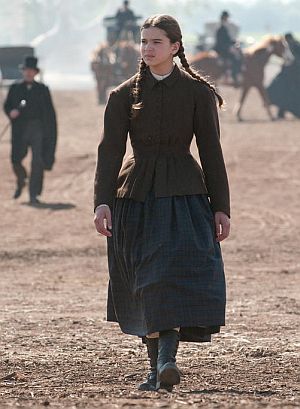 Based on the original source material – which was very much focused on John Wayne – and the trailers, you’d be forgiven for thinking of this as just another macho Western. However, I read some pieces which suggested that wasn’t the case, with the story [as in the original novel] told from the viewpoint of teenage girl Mattie Ross (Steinfeld), who hires drunken Marshal Rooster Cogburn (Bridges) to hunt down the outlaw (Brolin), who killed her father. That is indeed the case – despite Steinfeld getting an Oscar nomination for Best Supporting Actress, while Bridges was listed for Best Actor. Go figure.
Based on the original source material – which was very much focused on John Wayne – and the trailers, you’d be forgiven for thinking of this as just another macho Western. However, I read some pieces which suggested that wasn’t the case, with the story [as in the original novel] told from the viewpoint of teenage girl Mattie Ross (Steinfeld), who hires drunken Marshal Rooster Cogburn (Bridges) to hunt down the outlaw (Brolin), who killed her father. That is indeed the case – despite Steinfeld getting an Oscar nomination for Best Supporting Actress, while Bridges was listed for Best Actor. Go figure.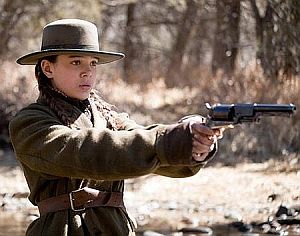 That said, there’s something refreshing about the way this is…well,
That said, there’s something refreshing about the way this is…well,  This 12-part serial from Republic was a spin-off from the success of Zorro – though despite the title, the Z-word is never mentioned. It moves the legend from Spanish California to Idaho in the 1880’s, just before a vote to decide whether it would become a state. Villainous Dan Hammond (McDonald) begins a violent campaign to prevent this, and is opposed by local newspaper owner Randolph Meredith, who has a secret identity as The Black Whip, a masked vigilante. When he is shot dead, his sister Barbara (Stirling) takes up the cape and whip, along with the help of undercover federal agent, Vic Gordon (Lewis). Together, they foil Hammond’s increasingly-desperate plots as voting day nears, and escape from 11 precarious positions. Well, it
This 12-part serial from Republic was a spin-off from the success of Zorro – though despite the title, the Z-word is never mentioned. It moves the legend from Spanish California to Idaho in the 1880’s, just before a vote to decide whether it would become a state. Villainous Dan Hammond (McDonald) begins a violent campaign to prevent this, and is opposed by local newspaper owner Randolph Meredith, who has a secret identity as The Black Whip, a masked vigilante. When he is shot dead, his sister Barbara (Stirling) takes up the cape and whip, along with the help of undercover federal agent, Vic Gordon (Lewis). Together, they foil Hammond’s increasingly-desperate plots as voting day nears, and escape from 11 precarious positions. Well, it 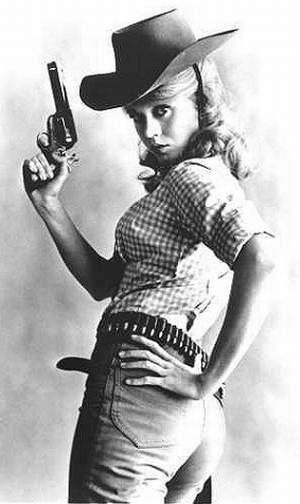 Aspiring teacher Catherine Ballou (Fonda), heads home to see her father in Wyoming, but finds him engaged in a struggle over his land with a land baron, and threatened by the villainous Tim Strawn (Marvin). She sends for legendary gun-fighter Kid Shelleen (also Marvin) to come protect them, only to find he is less legendary gun-fighter, and more alcoholic bum, incapable of saving himself. Strawn shoots Cat’s father and, when justice fails to be served, she heads off to a nearby outlaw town, where she vows to bring the land baron down and take revenge herself.
Aspiring teacher Catherine Ballou (Fonda), heads home to see her father in Wyoming, but finds him engaged in a struggle over his land with a land baron, and threatened by the villainous Tim Strawn (Marvin). She sends for legendary gun-fighter Kid Shelleen (also Marvin) to come protect them, only to find he is less legendary gun-fighter, and more alcoholic bum, incapable of saving himself. Strawn shoots Cat’s father and, when justice fails to be served, she heads off to a nearby outlaw town, where she vows to bring the land baron down and take revenge herself.
















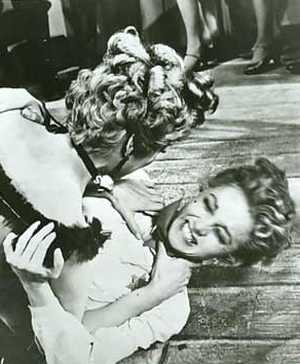 While Corman is better known now as a producer of schlock-horror, he has tried his hand at just about every genre in his time. This was his last stab at the Western, with Garland playing Rose Hood, who takes over as the marshal of Oracle, after her husband is gunned down. However, she incurs the wrath of local saloon-owner Erica Page (Hayes, best known for the title role in Attack of the 50 Ft. Woman), who is running a property-acquisition scheme, based on her hopes for the railroad to come to town. She brings hired killer Cane Miro (Ireland) up from Tombstone, only for him to fall for his intended victim, who is unaware of his mission. Which is surprising, since he is dressed from head to toe in black – even at age seven, when I used to watch The Virginian with my father, I knew this indicated an utterly irredeemable nature.
While Corman is better known now as a producer of schlock-horror, he has tried his hand at just about every genre in his time. This was his last stab at the Western, with Garland playing Rose Hood, who takes over as the marshal of Oracle, after her husband is gunned down. However, she incurs the wrath of local saloon-owner Erica Page (Hayes, best known for the title role in Attack of the 50 Ft. Woman), who is running a property-acquisition scheme, based on her hopes for the railroad to come to town. She brings hired killer Cane Miro (Ireland) up from Tombstone, only for him to fall for his intended victim, who is unaware of his mission. Which is surprising, since he is dressed from head to toe in black – even at age seven, when I used to watch The Virginian with my father, I knew this indicated an utterly irredeemable nature.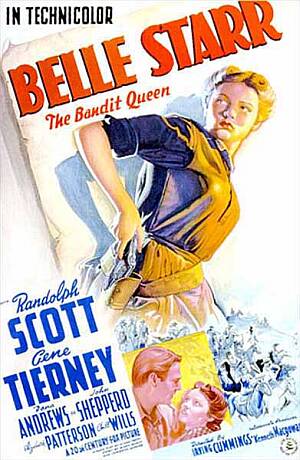 There’s something startlingly incorrect about this 1941 film, which makes its heroine, Belle (Tierney), an unrepentant Confederate mansion owner. She regrets the end of the Civil War and joins a rebel group who keep fighting, marrying their leader Sam Starr (Scott), only to find their morality may not quite live up to her own. It’s interestingly even-handed, with neither side being “good” or “bad”; Belle blames the Yankees for the death of her father and the burning of her home, but the leader of their forces, Major Grail (Andrews) is a sympathetic character who carries a torch for Belle. Naturally, given the era, Belle is more of an assistant, loading Sam’s rifles during a gun-battle, rather than firing them herself and it’s remarkable how her hair and dresses remain impeccable, even when she’s livin’ la vida outlaw. However, she’s a fine, independent-minded heroine, prepared to take decisive action to support her beliefs – highly dubious though they may be.
There’s something startlingly incorrect about this 1941 film, which makes its heroine, Belle (Tierney), an unrepentant Confederate mansion owner. She regrets the end of the Civil War and joins a rebel group who keep fighting, marrying their leader Sam Starr (Scott), only to find their morality may not quite live up to her own. It’s interestingly even-handed, with neither side being “good” or “bad”; Belle blames the Yankees for the death of her father and the burning of her home, but the leader of their forces, Major Grail (Andrews) is a sympathetic character who carries a torch for Belle. Naturally, given the era, Belle is more of an assistant, loading Sam’s rifles during a gun-battle, rather than firing them herself and it’s remarkable how her hair and dresses remain impeccable, even when she’s livin’ la vida outlaw. However, she’s a fine, independent-minded heroine, prepared to take decisive action to support her beliefs – highly dubious though they may be.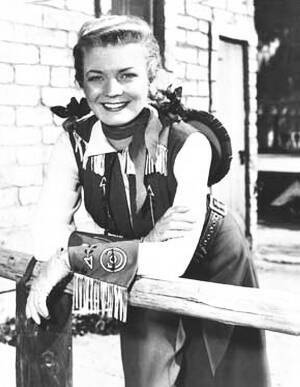 This TV series was Gene Autry’s idea; he wanted to give little girls a western star of their own, and created a show based on the character of Oakley, the most famous sharpshooter of all time. In his version, she lives in Diablo with her brother Tagg (Hawkins) and keeps the town safe along with deputy Lofty Craig (Johnson) – the sheriff, Annie’s uncle Luke, was somehow very rarely around… It ran for 81 episodes from January 1954 to February 1957; two DVDs, with five first season stories on each, have been released by Platinum – you can get the box set of both for $5.99, which is a steal.
This TV series was Gene Autry’s idea; he wanted to give little girls a western star of their own, and created a show based on the character of Oakley, the most famous sharpshooter of all time. In his version, she lives in Diablo with her brother Tagg (Hawkins) and keeps the town safe along with deputy Lofty Craig (Johnson) – the sheriff, Annie’s uncle Luke, was somehow very rarely around… It ran for 81 episodes from January 1954 to February 1957; two DVDs, with five first season stories on each, have been released by Platinum – you can get the box set of both for $5.99, which is a steal.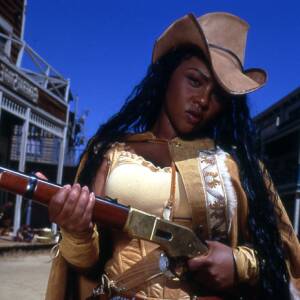 This comes across less like a Western, more like a feature-length rap promo – with every bit as much emotional depth or historical accuracy. The idea that a gang of ethnic gun-toting women could ever ride into town at the turn of the century, and get served at the local saloon with little problem stretches credulity to near-breaking. It then snaps entirely when faced with their always-immaculate clothes and hair, even as the ladies sleep rough. The group of former bank-robbers return to the fray after the sister of one is killed by outlaws, under the control of the one-eyed Bobby Brown. Insert Whitney Houston joke here. He and his gang have taken control of a town, from a sheriff with a startlingly Australian accent, as part of their search for treasure supposedly buried locally.
This comes across less like a Western, more like a feature-length rap promo – with every bit as much emotional depth or historical accuracy. The idea that a gang of ethnic gun-toting women could ever ride into town at the turn of the century, and get served at the local saloon with little problem stretches credulity to near-breaking. It then snaps entirely when faced with their always-immaculate clothes and hair, even as the ladies sleep rough. The group of former bank-robbers return to the fray after the sister of one is killed by outlaws, under the control of the one-eyed Bobby Brown. Insert Whitney Houston joke here. He and his gang have taken control of a town, from a sheriff with a startlingly Australian accent, as part of their search for treasure supposedly buried locally.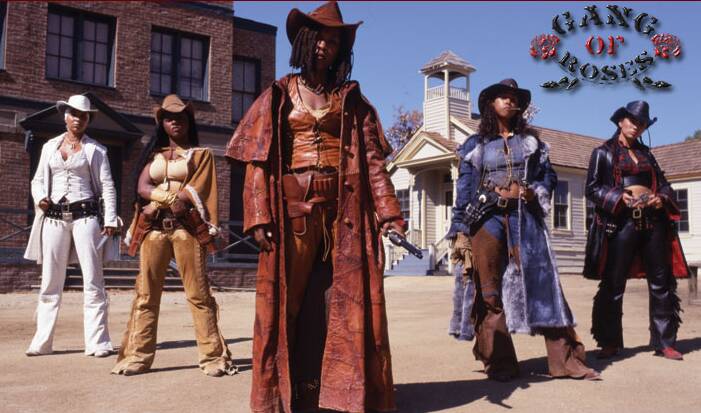
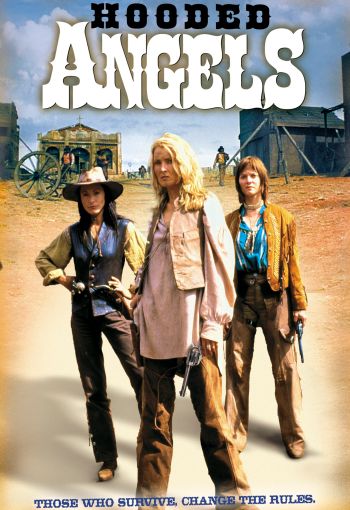
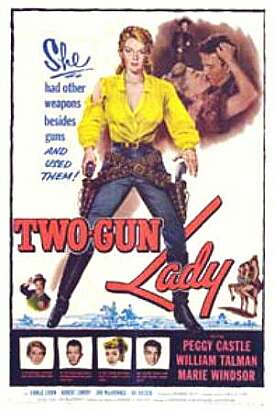
 Trick-shot artist Kate Masters (Castle) comes to a remote town with her show, raising suspicions among locals, who suspect she’s more than she seems. They are led by Jud Ivers (McDonald) and his family, who rule the area with an iron grip. This 1955 B-movie (in the original sense – it’s only 71 minutes long) crams plenty in, with almost everyone having secrets, good or bad. Castle makes a fine heroine, exuding strength but ultimately vulnerable, and is matched by the rest of the cast. Particular credit to McDonald, and Jennifer Jason Leigh’s mother, Barbara Turner, in her movie debut as Jenny Ivers; both bring depth to what could be one-dimensional characters.
Trick-shot artist Kate Masters (Castle) comes to a remote town with her show, raising suspicions among locals, who suspect she’s more than she seems. They are led by Jud Ivers (McDonald) and his family, who rule the area with an iron grip. This 1955 B-movie (in the original sense – it’s only 71 minutes long) crams plenty in, with almost everyone having secrets, good or bad. Castle makes a fine heroine, exuding strength but ultimately vulnerable, and is matched by the rest of the cast. Particular credit to McDonald, and Jennifer Jason Leigh’s mother, Barbara Turner, in her movie debut as Jenny Ivers; both bring depth to what could be one-dimensional characters.